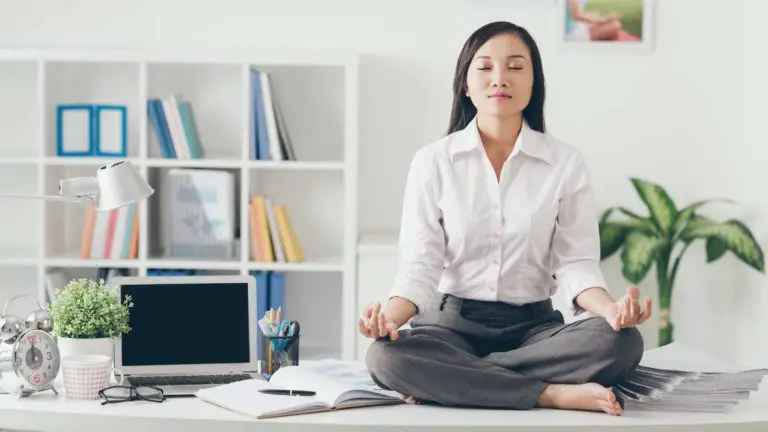Most yoga teachers and meditation gurus recommend meditating either at sunrise or sunset to reap the benefits of this mindful practice. And while early mornings can be pleasurable, meditating after dinner is a bit more challenging.
You shouldn’t meditate after a meal because you tend to feel drowsy and are likely to fall asleep. Additionally, it isn’t easy to keep your attention to the task at hand if you’re meditating after a meal.
In this article, we’ll explore why meditating right after a meal is ineffective. I’ll also offer some tips on how you can make your meditation practice as effective as possible.
Why You Shouldn’t Meditate After Eating?
Meditation is the act of going inward and trying to stay focused on the present moment. It is easier to meditate if you’re open to the thoughts that pass through your mind without trying to hold onto or get rid of them.
While it may seem pretty straightforward, steadying the mind is complicated and requires a delicate balance of relaxation and attentiveness. It’s challenging to achieve this balance on a full stomach.
Here’s why you should avoid meditating after a meal:
Digesting Consumes Energy
Digestion accounts for nearly 5% to 15% of the body’s daily energy expenditure, which means it’s probably the most energy-intensive process in the human body. This consumption of energy is why you’ll notice yourself feeling tired or drained out after indulging in an all-you-can-eat buffet.
On the surface, it may seem like meditation requires almost no energy, and all you have to do is sit and close your eyes. However, you need a significant quantity of energy to focus your attention for an extended period and avoid getting distracted by stray thoughts.
To delve into a more profound practice, you will need an ample amount of energy. And if you’ve just eaten, most of your energy is channeled into digestion, with little left for meditation.
You May Fall Asleep
As mentioned, digestion consumes a significant portion of our body’s total energy stores. This diversion of energy is why our brains tend to feel sluggish after a big meal.
While meditating, you will focus on relaxing your mind and slowing down thought processes. However, this relaxation must be accompanied by alertness to ensure you can observe the process as it unfolds.
Without energy to stay alert, you’re likely to fall asleep while meditating, especially if you’re planning to meditate at night, after dinner, and are already tired from a long day at work.
Physical Discomfort
While meditating, it’s crucial to find a quiet space and rid yourself of pent-up anxieties and distractions before going within. Aside from your surroundings, it’s also essential to pay attention to bodily sensations when you sit down to meditate.
If you’re in physical pain or feeling agitated, it can be challenging to quieten your mind and reach a mental state that makes meditation possible. Similarly, when you’ve just eaten, the body tends to feel heavy, and this state can impede the meditative process.
If your stomach is full, it can be uncomfortable to sit in padmasana (lotus posture) or kneel for an extended period. And if you’re physically uncomfortable, your mind will be too distracted to meditate effectively.
Ineffective Practice
It is, of course, possible to sit down after a meal and force yourself to meditate. With significant effort, you should be able to tap into a state of meditative flow.
However, the physical discomfort and drowsiness will impede your practice and make it challenging to go deep into meditation. When you meditate, you should strive for a practical approach that will take you deep within.
Meditating after eating is a waste of energy as it can be challenging to achieve the kind of depth required to reap positive results.
Tips to Make Your Meditation Practice More Effective
No matter what type of meditation you engage in, it’s best to try and delve deeper into the mind every time you sit down. Instead of simply trying to build a habit, try and engage in effective sessions that will help create lasting changes in your life.
Here are a few tips to keep in mind when meditating:
Get Rid of Distractions
This one is a no-brainer, but it is worth mentioning. It’s essential to clear any distractions that can interrupt your meditative practice. Removing distractions can mean anything from putting your phone on silent and locking yourself in a separate room to getting up early before the rest of the household is awake.
Clearing distractions help you create an optimal environment to focus and go deeper into your mental landscape without worrying about being disrupted. In fact, just the routine of getting rid of distractions can significantly enhance your meditation practice by putting you in the right headspace before you even get to actual meditation.
Shake Off Excesses
Sometimes, you may feel agitated, stressed, or even excited before meditation. During these instances, it is crucial to shake off the excess energy before sitting down to meditate.
You can dissipate this energy by going for a walk, practicing yoga, or engaging in light exercise before meditating. These activities can help steady the mind and prepare you to deal with whatever comes up while you meditate.
Eat Much Earlier
If you’re planning to meditate around mealtimes, consider eating at least ninety minutes before your session. This gap will allow your body to digest food and convert it into energy, which can then be used while meditating.
Meditate at the Same Time Every Day
One of the most effective ways to improve your practice is to schedule your meditation session at the same time every day. Meditation is a skill, and regular sessions are essential if you want to delve deeper and reap the benefits it has to offer.
If you meditate daily at the same time, your mind will get accustomed to entering a meditative state around this time of the day, making it easier to go inward.
As mentioned, sunrise and sunset are optimal for regular practice. Just be sure not to overeat at dinner!
Final Thoughts
Starting a regular meditation practice can be challenging, but it’s one of the quickest ways to improve the overall quality of your life. Just make sure to eat either after meditating or give yourself a gap of 90 minutes after you eat before you sit down to meditate.








